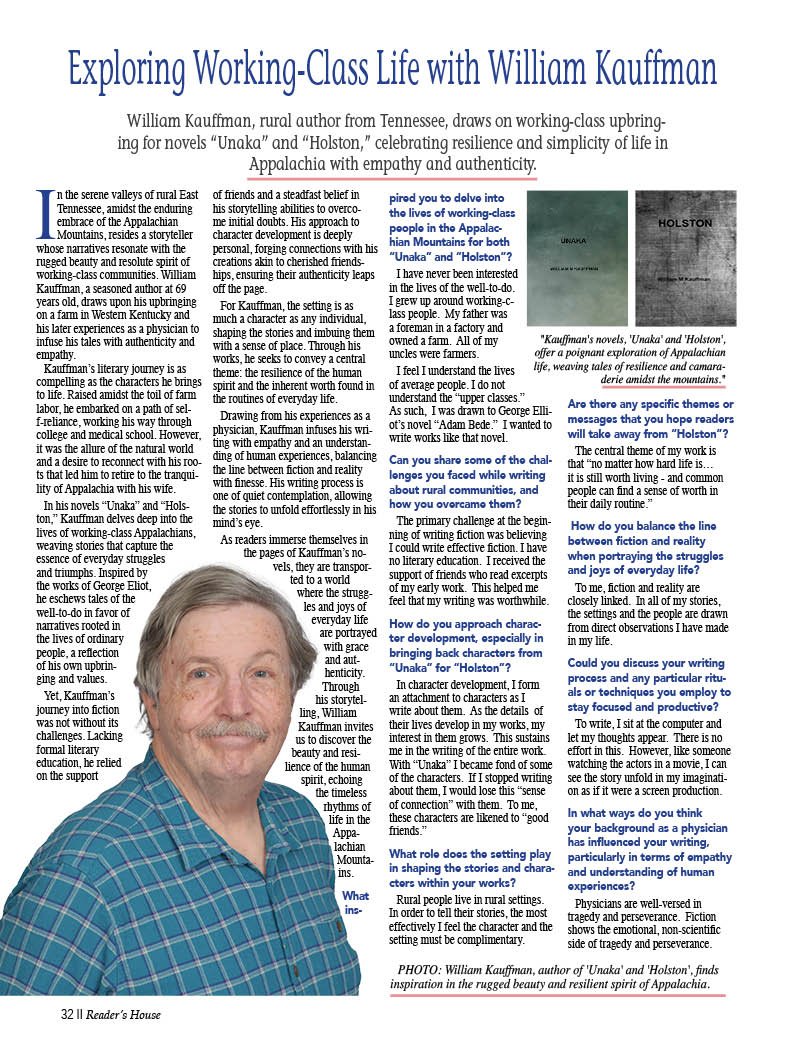William Kauffman, rural author from Tennessee, draws on working-class upbringing for novels Unaka and Holston, celebrating resilience and simplicity of life in Appalachia with empathy and authenticity.
BY DAN PETERS
In the serene valleys of rural East Tennessee, amidst the enduring embrace of the Appalachian Mountains, resides a storyteller whose narratives resonate with the rugged beauty and resolute spirit of working-class communities. William Kauffman, a seasoned author at 69 years old, draws upon his upbringing on a farm in Western Kentucky and his later experiences as a physician to infuse his tales with authenticity and empathy.
Kauffman’s literary journey is as compelling as the characters he brings to life. Raised amidst the toil of farm labor, he embarked on a path of self-reliance, working his way through college and medical school. However, it was the allure of the natural world and a desire to reconnect with his roots that led him to retire to the tranquility of Appalachia with his wife.
In his novels Unaka and Holston, Kauffman delves deep into the lives of working-class Appalachians, weaving stories that capture the essence of everyday struggles and triumphs. Inspired by the works of George Eliot, he eschews tales of the well-to-do in favor of narratives rooted in the lives of ordinary people, a reflection of his own upbringing and values.
Yet, Kauffman’s journey into fiction was not without its challenges. Lacking formal literary education, he relied on the support of friends and a steadfast belief in his storytelling abilities to overcome initial doubts. His approach to character development is deeply personal, forging connections with his creations akin to cherished friendships, ensuring their authenticity leaps off the page.
For Kauffman, the setting is as much a character as any individual, shaping the stories and imbuing them with a sense of place. Through his works, he seeks to convey a central theme: the resilience of the human spirit and the inherent worth found in the routines of everyday life.
Drawing from his experiences as a physician, Kauffman infuses his writing with empathy and an understanding of human experiences, balancing the line between fiction and reality with finesse. His writing process is one of quiet contemplation, allowing the stories to unfold effortlessly in his mind’s eye.
As readers immerse themselves in the pages of Kauffman’s novels, they are transported to a world where the struggles and joys of everyday life are portrayed with grace and authenticity. Through his storytelling, William Kauffman invites us to discover the beauty and resilience of the human spirit, echoing the timeless rhythms of life in the Appalachian Mountains.
What inspired you to delve into the lives of working-class people in the Appalachian Mountains for both Unaka and Holston?
I have never been interested in the lives of the well-to-do. I grew up around working-class people. My father was a foreman in a factory and owned a farm. All of my uncles were farmers.
I feel I understand the lives of average people. I do not understand the “upper classes.” As such, I was drawn to George Elliot’s novel “Adam Bede.” I wanted to write works like that novel.
Can you share some of the challenges you faced while writing about rural communities, and how you overcame them?
The primary challenge at the beginning of writing fiction was believing I could write effective fiction. I have no literary education. I received the support of friends who read excerpts of my early work. This helped me feel that my writing was worthwhile.
How do you approach character development, especially in bringing back characters from Unaka and Holston?
In character development, I form an attachment to characters as I write about them. As the details of their lives develop in my works, my interest in them grows. This sustains me in the writing of the entire work. With “Unaka” I became fond of some of the characters. If I stopped writing about them, I would lose this “sense of connection” with them. To me, these characters are likened to “good friends.”
What role does the setting play in shaping the stories and characters within your works?
Rural people live in rural settings. In order to tell their stories, the most effectively I feel the character and the setting must be complimentary.
Are there any specific themes or messages that you hope readers will take away from Holston?
The central theme of my work is that “no matter how hard life is…it is still worth living – and common people can find a sense of worth in their daily routine.”
How do you balance the line between fiction and reality when portraying the struggles and joys of everyday life?
To me, fiction and reality are closely linked. In all of my stories, the settings and the people are drawn from direct observations I have made in my life.
Could you discuss your writing process and any particular rituals or techniques you employ to stay focused and productive?
To write, I sit at the computer and let my thoughts appear. There is no effort in this. However, like someone watching the actors in a movie, I can see the story unfold in my imagination as if it were a screen production.
In what ways do you think your background as a physician has influenced your writing, particularly in terms of empathy and understanding of human experiences?
Physicians are well-versed in tragedy and perseverance. Fiction shows the emotional, non-scientific side of tragedy and perseverance.



